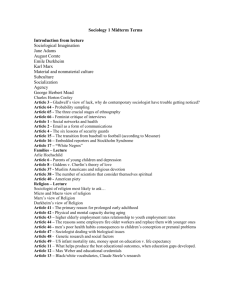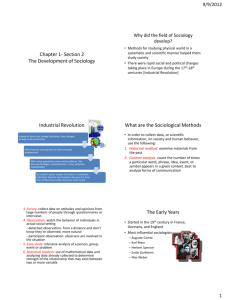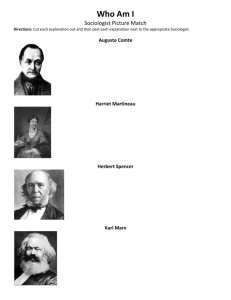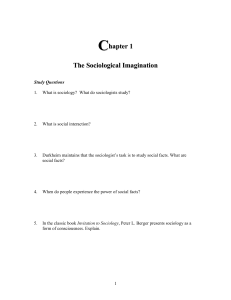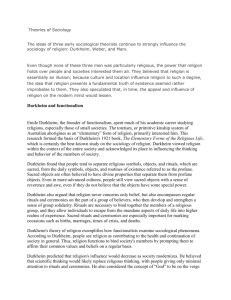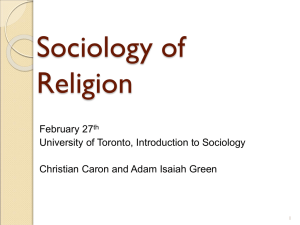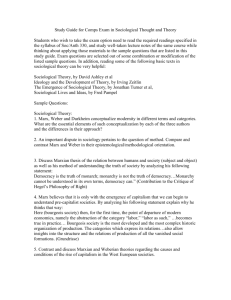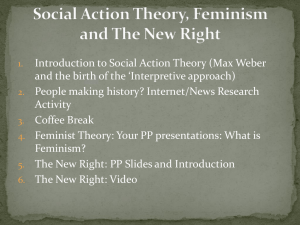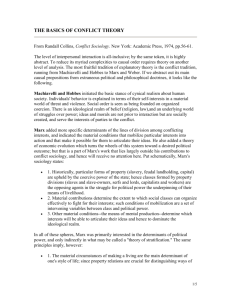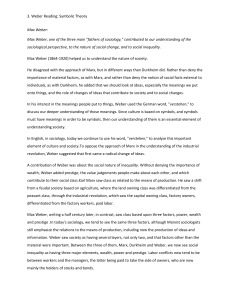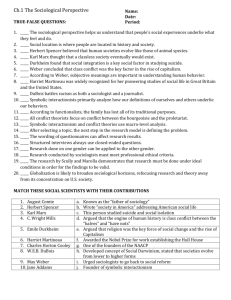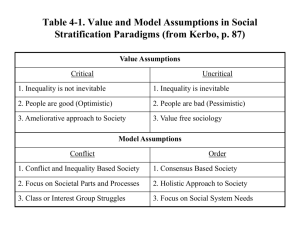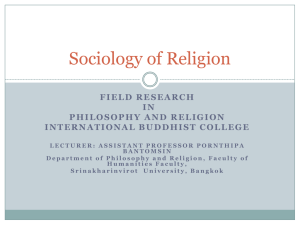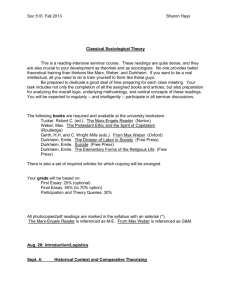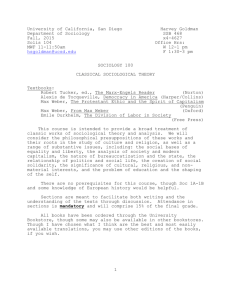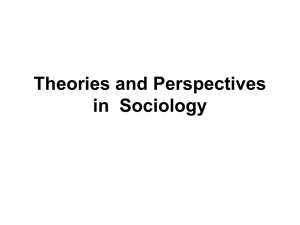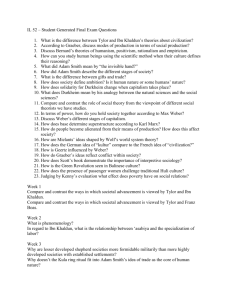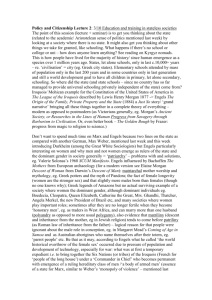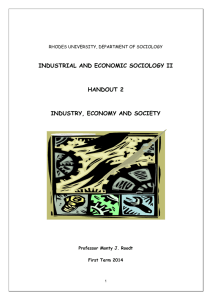SOCIOLOGICAL IMAGINATION AND INVESTIGATION
advertisement
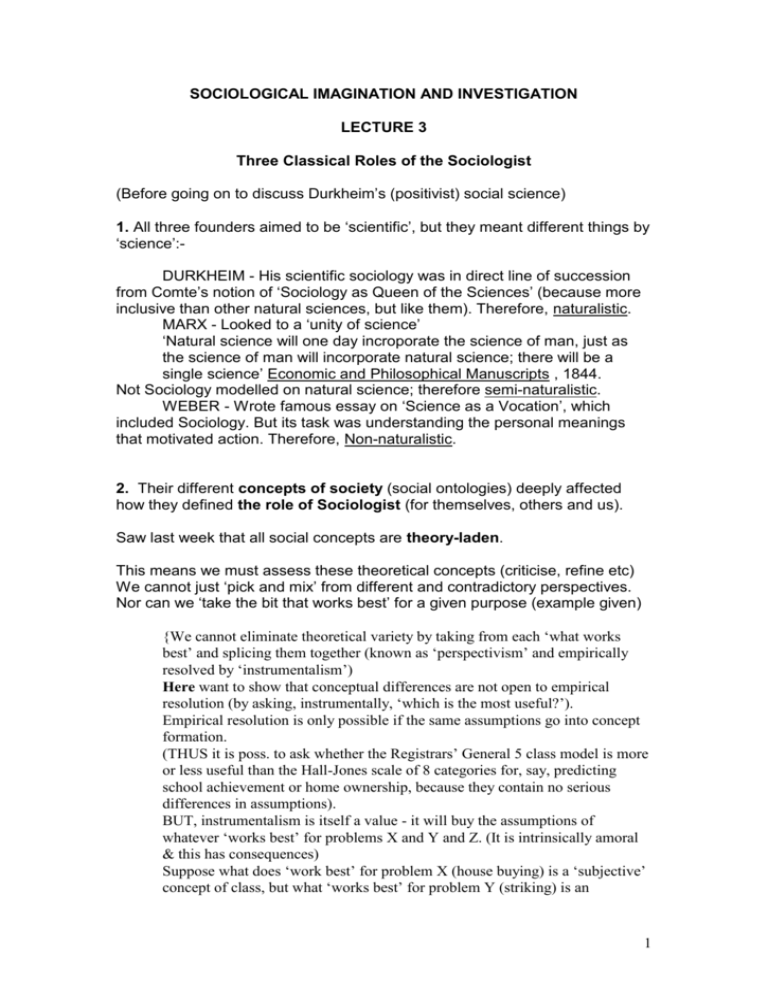
SOCIOLOGICAL IMAGINATION AND INVESTIGATION
LECTURE 3
Three Classical Roles of the Sociologist
(Before going on to discuss Durkheim’s (positivist) social science)
1. All three founders aimed to be ‘scientific’, but they meant different things by
‘science’:DURKHEIM - His scientific sociology was in direct line of succession
from Comte’s notion of ‘Sociology as Queen of the Sciences’ (because more
inclusive than other natural sciences, but like them). Therefore, naturalistic.
MARX - Looked to a ‘unity of science’
‘Natural science will one day incroporate the science of man, just as
the science of man will incorporate natural science; there will be a
single science’ Economic and Philosophical Manuscripts , 1844.
Not Sociology modelled on natural science; therefore semi-naturalistic.
WEBER - Wrote famous essay on ‘Science as a Vocation’, which
included Sociology. But its task was understanding the personal meanings
that motivated action. Therefore, Non-naturalistic.
2. Their different concepts of society (social ontologies) deeply affected
how they defined the role of Sociologist (for themselves, others and us).
Saw last week that all social concepts are theory-laden.
This means we must assess these theoretical concepts (criticise, refine etc)
We cannot just ‘pick and mix’ from different and contradictory perspectives.
Nor can we ‘take the bit that works best’ for a given purpose (example given)
{We cannot eliminate theoretical variety by taking from each ‘what works
best’ and splicing them together (known as ‘perspectivism’ and empirically
resolved by ‘instrumentalism’)
Here want to show that conceptual differences are not open to empirical
resolution (by asking, instrumentally, ‘which is the most useful?’).
Empirical resolution is only possible if the same assumptions go into concept
formation.
(THUS it is poss. to ask whether the Registrars’ General 5 class model is more
or less useful than the Hall-Jones scale of 8 categories for, say, predicting
school achievement or home ownership, because they contain no serious
differences in assumptions).
BUT, instrumentalism is itself a value - it will buy the assumptions of
whatever ‘works best’ for problems X and Y and Z. (It is intrinsically amoral
& this has consequences)
Suppose what does ‘work best’ for problem X (house buying) is a ‘subjective’
concept of class, but what ‘works best’ for problem Y (striking) is an
1
‘objective’ concept - THEN the instrumentalist is condemned to accepting two
contradictory assumptions about ‘class’ AND ones which assigns the same
people to different classes!
SO, there are fundamental conceptual issues which have to be debated - the
criterion of ‘workability’ cannot do this task for us.}
It is all the more necessary when it is the very concept of society which is at
stake (and underlies each founder’s entire theoretical approach)
These concepts differed hugely for the thee founders, in terms of
What is society like (what is an analogy for it?)
Is it an aggregate or a whole?
Is it going somewhere ( an historical trajectory) or not?
Is it ‘out there’ (external to us) or ‘in here’ (in our heads)
They answered these differently because they held three different ‘images
of society’ (which meant they held different social ontologies)
DURKHEIM - Society modelled on an Organism (like a body)
MARX - Society modelled as Base and Superstructure (hub and
spokes model)
WEBER - Society modelled as an ‘endless flux’ of meaningful
actions (like weaving and re-weaving)
To these models corresponded their different definitions of a ‘science of
society’
And, consequently, different roles for the social scientist :DURKHEIM - applied science
MARX committed science
WEBER - Science as a ‘calling’
ROLE Social Engineer
ROLE Advocate of the Exploited
ROLE Interpreter of Others
We will now look briefly at the three in turn.
3. Durkheim - the Organic Analogy - the Sociologist as Social Engineer
D. begins from the analogy of society as an organism - like the body, each part is
interrelated and thus must be studied holistically; it has an objective preferred
state (health) and deviations from it (pathologies).
D. is also the Worried Man of the Third Republic, wondering specifically how
France can regain socio-political ‘health’, i.e. stability/order.
(I) Every study is rooted in the organic analogy/image - meaning Society must be
studied as a whole, in its own right, not, as it were, at the level of its cells:“for a whole is not identical with the sum of its parts, and its properties differ
from those of its component parts[....] society is not the mere sum of
individuals. Rather, the system formed by their association represents a
specific reality which has its own characteristics” Rules , p. 103.
2
The state of the body social is crucial because “individual natures are merely the
indeterminate material that the social moulds and transforms” Rules, p. 106
(II) SO, each study is about how the relations of the parts (not the people) produces
either ‘health’ or ‘pathology’.
Division of labour - held that capitalist societies could show ‘organic solidarity’
because occupational specialisation allows different groups to attain diff. ends without
conflict being inevitable.
“The soldier seeks military glory, the priest moral authority, the statesman
power, the businessman riches, the scholar scientific renown. Each of them can attain
his end without preventing others from attaining theirs[...] since they perform different
services, they can perform them parallely” Division of Labour, p.267.
Ideally, the div. of lab. promotes co-operation differentiation interdependence
re-integration. BUT ‘pathologies’ develop - the ‘forced’ & ‘anomic’ forms.
D. responds with remedies, e.g. common education, meritocracy, abolition of
inherited wealth, occupational associations.
SUICIDE Its rise in Europe indicates the same pathology -a decline in social
integration. REMEDY -(among others) after finding suicide rate is lower among the
married - make dIvorce more difficult.
ELEMENTARY FORMS OF RELIGIOUS LIFE
FINDING: traditional religion no longer performed its old integrative function
REMEDY: create a new form of moral cement - 'civic morals'
Can see how his 'image' of society being like an organism licensed him to solve his
moral anxiety about France's instability by Social Engineering.
4. MARX: Base, Superstructure and Midwifery
Marx's image was one where all societies shared a cornmon structure - their core
feature was their BASE (forces and relations of production), which are the foundation
of all other social institutions (SUPERSTRUCTURE).
Although wanting to produce a scientific analysis, this should also be a committed
one: The point of studying the world is to change it > open advocacy of working class
interests.
His 'image' or 'model' was also allied to a 'process' of change -in all social
formations this was due to the forces and relations of production coming into
'contradiction '.
When they did, then class action could introduce radical social transformation.
"In the social production which men carryon they enter into defInite
relations which are indispensable and independent of their will; these relations of
production correspond to a definite stage of development of their material powers of
production. The totality of these relations of production constitutes the economic
structure of society -the real foundation, on which legal and political superstructures
arise and to which definite forms of social consciousness correspond […] At a certain
stage of their development, the material forces of production come into conflict with
the existing relations of production […] Then occurs a period of social revolution.
With the change of the economic foundation the entire immense superstructure is
more or less rapidly transformed" (1859) ‘Preface to a Critique of Political Economy’
3
But any 'contradiction' and ensuing transformation is dependent upon (class) action:
it is 'activity-dependent' > therefore, it may not happen at all or it may happen slowly.
The task of the sociologist is not merely to detect which historical stage has been
reached, BUT to speed up the process.
HENCE Marx talked about our role as 'midwives of the revolution'.
His role as ADVOCATE of the working class is evident in his two types of
publications: academic for the academics, but also the ‘Communist Manifesto’,
intended to be read by workers and acted upon.
5. Weber: the endless flux of social action -and sociological investigation
Weber did not have an image of society as always being ordered in the same basic
patter (unlike Durkheim's 'organism' or Marx's 'base and superstructure' model).
However, to see history as an ‘endless flux’ without any particular and recurrent
structured form, is still to have an image – of it being woven and re-woven.
It sets us a different task: namely to discover why 'things were so and not otherwise' at
any given time/place, rather than supplying us with a model of what to look for.
'Images' of society direct our investigations of it. How can Weber's do so?
Weber's own answer hinges on discovering the ‘meanings’ held by people that
together produce a pattern at any given time:"(The) sociologist begins with the question: what motives determine and lead
individual members and participants in this [… ] community to behave in such a way
that the community came into being in the first place and that it continues to exist"
‘Theory of Social and Economic Organisation ‘
This leads to a task that is alien to an 'objectivist' sociology, which examines
external relations. Here, instead, we are to understand motives, which means we have
to grasp meanings of people in society.
FOR all social action is action in which individuals orientate themselves to others (as
either means or goals) and this entails grasping their meanings in doing so. We are
aided in being of the same kind (people) as our subject matter. This is an advantage
we have over natural scientists of matter.
BUT it involves getting at non-observables (motives, attitudes, opinions, beliefs),
some of which may not be clear to the subjects themselves.
So he puts forward his method of 'interpretative understanding' (verstehen which is
not the same as empathy) -of people in their context, from which he seeks to build up
a typology - a motivational classification of those with the same orientations (these are
his Ideal Types, e.g. of the early capitalist who reinvests because of his Calvinistic
insecurity about his salvation).
IF this works (meaning it is an assertion warranted by the evidence), then he can claim
to have contributed to explaining 'why things were so and not otherwise’.
4
Conclusion
What is central to the role of the sociologist is always his/her concept of society.
Theory and practice/ theory and methods always inter-linked.
The social ontology grounding the theory also shapes the practical and moral role of
the sociologist.
5
